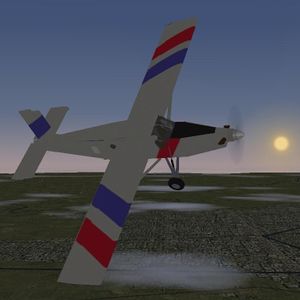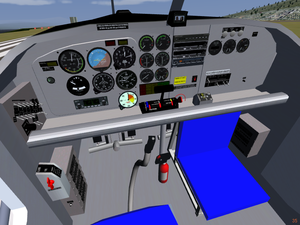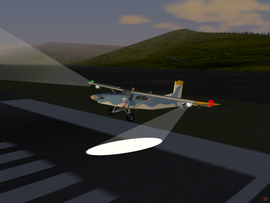Pilatus PC-6 Porter: Difference between revisions
Jump to navigation
Jump to search
(udpate) |
(Switched to the Pilatus PC-6 Porter/info documentation page for the aircraft infobox by transcluding {{:{{PAGENAME}}/info}}, updating to the current information in FGAddon.) |
||
| (14 intermediate revisions by 6 users not shown) | |||
| Line 1: | Line 1: | ||
{{ | {{:{{PAGENAME}}/info}} | ||
'''Pilatus PC-6 Porter''' is a single-engined utility [[aircraft]]. It is famous in the aviation world for its Short Take-off and Landing (STOL) performance on almost any type of terrain; it can take-off within a distance of 195 metres (640 ft) and land within a distance of 130 metres (427 ft) while carrying a payload of 1,500 kg (3,300 lb). | |||
== Aircraft help == | |||
| | {| class="keytable" | ||
! Key | |||
! Function | |||
| | |- | ||
| | | {{key press|Ctrl|L}} | ||
| | | Toggle tailwheel lock | ||
| | |} | ||
| | |||
| | |||
=== Takeoff === | |||
* Flaps down 10 degrees. | |||
* Apply 100% Engine RPM While accelerating raise the tail. | |||
* Be prepared to use Rudder to counteract Swing. | |||
=== Climb and cruise === | |||
* The plane picks up speed fast so be sure to raise Flaps below 80 kts. | |||
* The best climb speed is 80-90 kts. | |||
* Cruise Power is at 90% Engine RPM. | |||
=== Landing === | |||
[[File:pc-6-1.png|270px|right|thumb|adjustable Landing Lights]] | |||
* Lower Flaps under 80 kts and set Prop to Max RPM. | |||
* Approach Speed is 60-70 kts. | |||
* Approach the threshold with 60 kts. | |||
* Don't reduce power too early as the idle prop acts as effective speed brake. | |||
== Features == | |||
* Complete 3D cockpit with lots of controllable switches | |||
* Engine and structural failure simulation | |||
* Co-pilot comments | |||
* Livery selection | |||
== External links == | |||
* [http://www.pilatus-aircraft.com/ Official website] | |||
* [http://www.pc-6.com/ The Pilatus Porter World] | |||
{{Pilatus Aircraft}} | |||
Latest revision as of 16:02, 27 August 2016
 | |
|---|---|
 | |
 3D Cockpit | |
| Type | Civil utility aircraft, STOL aircraft |
| Configuration | High wing aircraft |
| Propulsion | Piston aircraft, Single-engine aircraft |
| Manufacturer | Pilatus aircraft |
| Author(s) |
|
| FDM | YASim |
| --aircraft= | PC6-B2H4 |
| Status | Early production |
| FDM |
|
| Systems |
|
| Cockpit |
|
| Model |
|
| Development | |
| Website |
|
| Repository |
|
| Download |
|
| License | GPLv2+ |
|
| |
Pilatus PC-6 Porter is a single-engined utility aircraft. It is famous in the aviation world for its Short Take-off and Landing (STOL) performance on almost any type of terrain; it can take-off within a distance of 195 metres (640 ft) and land within a distance of 130 metres (427 ft) while carrying a payload of 1,500 kg (3,300 lb).
Aircraft help
| Key | Function |
|---|---|
| Ctrl+L | Toggle tailwheel lock |
Takeoff
- Flaps down 10 degrees.
- Apply 100% Engine RPM While accelerating raise the tail.
- Be prepared to use Rudder to counteract Swing.
Climb and cruise
- The plane picks up speed fast so be sure to raise Flaps below 80 kts.
- The best climb speed is 80-90 kts.
- Cruise Power is at 90% Engine RPM.
Landing
- Lower Flaps under 80 kts and set Prop to Max RPM.
- Approach Speed is 60-70 kts.
- Approach the threshold with 60 kts.
- Don't reduce power too early as the idle prop acts as effective speed brake.
Features
- Complete 3D cockpit with lots of controllable switches
- Engine and structural failure simulation
- Co-pilot comments
- Livery selection
External links
| ||||||||
